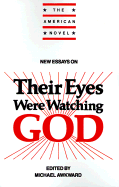Book contents
- Frontmatter
- Contents
- Series Editor's Preface
- 1 Introduction
- 2 The Personal Dimension in Their Eyes Were Watching God
- 3 “Crayon Enlargements of Life”: Zora Neale Hurston's Their Eyes Were Watching God as Autobiography
- 4 The Politics of Fiction, Anthropology, and the Folk: Zora Neale Hurston
- 5 Power, Judgment, and Narrative in a Work of Zora Neale Hurston: Feminist Cultural Studies
- Notes on Contributors
- Selected Bibliography
5 - Power, Judgment, and Narrative in a Work of Zora Neale Hurston: Feminist Cultural Studies
Published online by Cambridge University Press: 01 March 2011
- Frontmatter
- Contents
- Series Editor's Preface
- 1 Introduction
- 2 The Personal Dimension in Their Eyes Were Watching God
- 3 “Crayon Enlargements of Life”: Zora Neale Hurston's Their Eyes Were Watching God as Autobiography
- 4 The Politics of Fiction, Anthropology, and the Folk: Zora Neale Hurston
- 5 Power, Judgment, and Narrative in a Work of Zora Neale Hurston: Feminist Cultural Studies
- Notes on Contributors
- Selected Bibliography
Summary
THE first time we see the hero/ine of Their Eyes Were Watching God, she is sauntering down a road, the knowing subject of gossiping judgment. Janie is an expressively sexual woman (her buttocks and “pugnacious breasts” are immediately mentioned). She is black, but her “great rope of black hair” operates as a marker of her racial mix, and an evocation of the internal color lines in the African-American community. She is all of forty – too old, according to her neighbors, collectively termed “Mouth-Almighty,” to change, adventure, or express sexuality. And finally, her overalls are a nice bit of cross-dressing, signifying equality and sexuality in gender terms, and in class terms signifying her double class status as property (petty-bourgeois – local notable) annealed to “poverty” (agricultural day worker). Janie can be seen from the very first moments of the novel to be made of signs, like “Alphabet,” her childhood nickname. These signs of Janie are constructed by Hurston to be conflictual and heterogeneous in the array of race, gender role, age, class, and sexual markers. However, as the early incident of the photograph pointedly tells, the multiplicity and plurality of “Alphabet” are focused suddenly: “Aw, aw! Ah'm colored!” (9). The paradox of Janie – her fascination – is Hurston's narrating Janie's efforts to spell her life with more than that one word “colored,” while necessarily, her life is focused by the social, economic, and cultural meanings of blackness.
- Type
- Chapter
- Information
- New Essays on Their Eyes Were Watching God , pp. 95 - 124Publisher: Cambridge University PressPrint publication year: 1991
- 5
- Cited by



